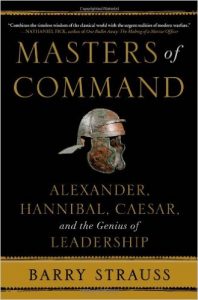 This is a great introduction to three of the most important historical figures of the Classical Age. Since lack of historical knowledge is a plague upon the land in these latter days, Strauss does us a great service by providing a popular, concise history of these men. He compounds this service by drawing parallels and contrasts among them, making it easier to understand and remember each, and caps his effort by drawing permanent, generally applicable lessons from the lives of each.
This is a great introduction to three of the most important historical figures of the Classical Age. Since lack of historical knowledge is a plague upon the land in these latter days, Strauss does us a great service by providing a popular, concise history of these men. He compounds this service by drawing parallels and contrasts among them, making it easier to understand and remember each, and caps his effort by drawing permanent, generally applicable lessons from the lives of each.
Strauss’s focus is, of course, on the military aspects of each of Alexander, Hannibal and Caesar, though he does touch on their political abilities as well. The campaigns of each are viewed through five stages: Attack; Resistance; Clash; Closing The Net; and Knowing When To Stop. Coupled with this are ten qualities of successful commanders: ambition; judgment; leadership; audacity; agility; infrastructure; strategy; terror; branding; and divine providence. The structure of the book is to, in essence, rate the performance of each of the three protagonists, in each stage, on each quality. Then, ultimately, Strauss gives a #1 ranking to the Most Successful Commander. (No, I won’t spoil it by saying who that is!)
This is not an executive leadership book, of course. Strauss does not generally try to suggest that you should try this at home (particularly “terror”). But the qualities he analyzes are certainly frequently applicable to other life contexts, and therefore the book works both as history and, to a limited extent, as guidance for one’s own life, if one has the ambition to command and succeed.
Strauss manages to cover a wide range of important events, mostly battles, without seeming cursory. The Granicus River. Gaugamela. Cannae. Zama. Thapsus. Pharsalus. It’s quite an accomplishment, if you stop and think about it, given that most of these events could rate a short book of their own. And Strauss manages to coherently weave each of them into the overall narrative, while writing about each of them compellingly. Somehow he manages to add enough anecdotes, written in vivid language, to bring each event alive, without drifting into history by anecdote. It’s a pretty impressive accomplishment.
Many of the lessons Strauss draws out, though well drawn out, are common sense. But many are not. One of his big focuses is “closing the net,” where he emphasizes the need to follow-up on victories, along with the difficulties in doing so. “A victor’s biggest mistake after winning a great battle is to expect success to fall into his lap. On the contrary, since necessity is the mother of invention, the vanquished are likely to be more ingenious than ever, and perhaps even more dangerous.” This is useful to remember.
None of this is idol-worship. Strauss criticizes his protagonists as much as he recognizes their accomplishments. And he notes the overriding vice of successfully military men—that though “No one every understood better than these three that war is politics. . . . then, at the moment of triumph, no one ever forgot the rule that war is politics as completely—or as disastrously—as they. Flush with victory and drunk with success, each man did the one thing that no successful general can ever dare do: he succumbed to his own vanity. Modern generals are not immune to excessive pride. But, in democracies at any rate, laws prevent any one individual from doing too much damage. History tells a cautionary tale.”
And that’s the real value of this book. It informs us today, both in what to do, and in what not to do. Great history transmits universal principles, and the more people read books like this, the better off our society will be.
